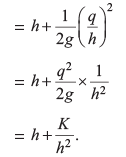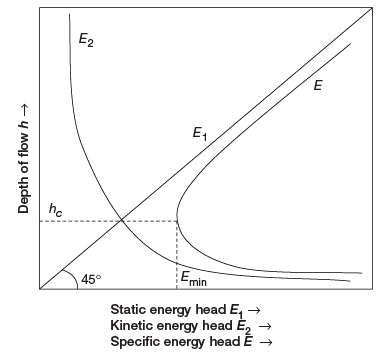Specific Energy | Irrigation Engineering - Civil Engineering (CE) PDF Download
Total energy head at a section in an open channel flow is given by:
E = z + h + (v2/2g)
Where, z is the elevation of the bottom of the channel from an arbitrary datum. If we take the datum as the bottom of the channel itself, the equation becomes.
E = h + (v2/2g)
This represents the specific energy of the channel flow.
Thus the specific energy at any section of a channel is the sum of the depth of flow and the kinetic head at that section.
In the case of a steady uniform flow, depth of flow and velocity is same at all sections. Therefore specific energy head is same at all sections.
Considering a non-uniform flow taking place in an open channel of rectangular cross-section of width b, at a steady rate Q.
Discharge per unit width,
q = Q/b = Constant.
Velocity at the section,
v = Q/bh
= q/h
or q = vh
Thus the product of velocity and depth of flow is constant at all sections.
E = h + (v2/2g)
Where, K = q2/2g.
Thus, for a given value of q specific energy head is a function of depth as follows.
E = E1 + E2
Here, E1 = h
and 
Where
E1 = Static energy head
E2 = Kinetic energy head
If we plot static energy head, kinetic energy head and specific energy head against depth flow, the graph obtained is as follows:
From the above, it follows that specific energy head first becomes lesser and lesser when depth increases and reaches a minimum and then it increases as the depth is increased.
The depth corresponding to minimum specific energy is called the critical depth (hc). When the depth of flow is greater than the critical depth, the flow is called streaming flow or tranquil flow or sub-critical flow.
Critical flow: When the flow is such that specific energy is minimum, the flow is called a critical flow. Therefore at critical flow, depth of flow is equal to the critical depth (hc).
The velocity of flow at critical depth is called the critical velocity.
|
7 videos|35 docs|31 tests
|
FAQs on Specific Energy - Irrigation Engineering - Civil Engineering (CE)
| 1. What is specific energy in civil engineering? |  |
| 2. How is specific energy calculated in civil engineering? |  |
| 3. What factors affect specific energy in civil engineering projects? |  |
| 4. How can specific energy be reduced in civil engineering projects? |  |
| 5. What are the advantages of considering specific energy in civil engineering projects? |  |

|
Explore Courses for Civil Engineering (CE) exam
|

|

















